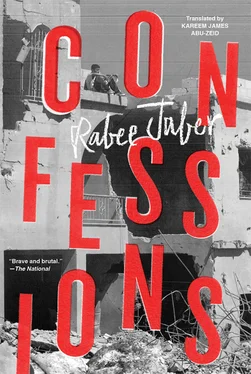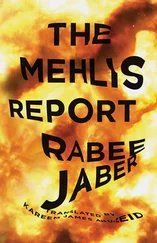What else should I tell you? We’ve all had those kinds of experiences. When Ilya gave me the key to his new apartment in Kaslik (he bought that one; he said he was trading fuel now) and I told her about it, she asked if I thought about my dead brother, if I thought about my brother who’d been kidnapped. I said I thought about him sometimes, but that I didn’t remember him very well because I was so young when they kidnapped him.
She sat on the edge of the bed and said she was thirsty. I was as embarrassed as she was, or even more so. I went to the kitchen and opened the fridge, which was full of bottles of water and soda and vodka and juice. There were countless types of cheese on the top shelf, and beside the fridge, in a basket made of bamboo, there were bottles of wine.
I came back to the room and saw her dress on the chair. She was under the covers, laughing. I remember her short-sleeved blue silk top on the back of the chair. I remember the feeling in my chest: emptiness. As if my soul had left me. As I embraced her and then entered her, the emptiness receded, and I felt a fullness within me.
We fell in love, and my mind was running wild, making plans, and running wild some more when she told me (on the upper floor of a patisserie on Mono Street that’s no longer there — she was eating ice cream and I was eating cake) that she couldn’t see me anymore. She said we had to break up. She said her father had asked that of her. She said her father knew our family and respected our family, but that he thought we weren’t right for one another. She said she couldn’t go against his wishes.
After my father’s operation, Ilya started visiting us every weekend. On one of those weekends, I found myself at Hilda’s place, sitting across from her father, listening to him speak without knowing how I’d come to be there. Hilda had disappeared after the meal, and her pale and sickly mother disappeared too, leaving me alone with him. Even the maid had disappeared. I don’t want to say that I hate him — all of this happened years ago, and it isn’t important anymore. He spoke about my father and said he knew the sacrifices he’d made. And he spoke about my brother and said he knew he’d been injured on the mountain. He fell silent for a moment, then told me he knew a lot of things about our family—“You have no idea how much I know, my boy”—and that he really did respect our house, but he knew what was right and what was wrong better than his daughter, and better than myself. “She’s not right for you, and you’re not right for her.” That was the gist of it, and the words hadn’t bothered me, but that look: once again, I found myself subjected to that strange look. Why was he looking at me like that? I wanted to ask him: “Why are you giving me that look?” But I didn’t.
Did I say his words didn’t bother me? That happened a long time ago, years ago — it’s easy to forget now. I saw Hilda in a dream after we broke up: she was walking on the edge of a mountain that was on the verge of collapsing. The place was similar to the Burj Hammoud landfill, and I could see piles of dirt sinking into the sea. The ground was sliding away beneath her as she called out. She was calling out to me (but wasn’t saying “Maroun”) as I ran toward her. Then the landfill disappeared, and so did the sea.
After the invasion of East Beirut, they arrested some of Ilya’s friends from the old days, then they were released. Antoine Tannouri and I crossed the demarcation line while they were digging up the remaining barricades with bulldozers. The war was over, and we were going to explore West Beirut. I didn’t find a ruined black city — no, I saw a city that looked like East Beirut. If you asked me what my first impressions from that trip were, I’d say three things: the dialect was different, there were a lot of run-down buildings, and the crowds were awful. We went into neighborhoods that frightened us: throngs and throngs of people.
We didn’t stray from campus much during our first few weeks in college. Then we slowly started to venture out: we discovered the area between Bliss and Hamra, and we discovered the Manara corniche. I can still remember the carts with pistachios and cashews crossing Hamra Street at night, the bright yellow glare of the gas lanterns on the packages of nuts. Later, once the peace had become more stable, they made it illegal for those wooden carts to be out on the roads. I don’t know why they made them illegal. They should have done the opposite, right? I used to buy nuts from them and go back to the dorm and call Antoine: he lived on the fourth floor, and I was above him on the fifth. I’d bring the nuts and he’d bring the beer.
I’ve told you before that something changed in me when I left the house in Achrafieh. To this day I don’t know how it happened. Many years have passed since then, and what I do remember is unclear. When I try to tell you now about what happened back then, the memories merge with what I imagine to be memories. I don’t know if you understand what I’m trying to say. I don’t know if there’s a way for me to express myself better. I remember, for example, standing on the fifth floor balcony one night, talking with my new neighbors: they were from all over, speaking different dialects, and some of them were in the business school, while others were studying engineering or chemistry, and so on. They had different majors and came from different places, and all of them had lived through the war the way I had, more or less. And now, like me, they’d entered a time of peace. When we talked, one of us would tell the others his stories — but cautiously, as if we were all moving through difficult terrain, as if we were checking the ground beneath our feet before advancing, before taking the next dangerous step forward…. It’s possible the others didn’t feel that way. But that’s how I felt. I wasn’t exactly on guard, but the whole time I could feel that I might (that I might ) be in danger. On the other hand, I felt safe. That was very odd to me: to feel safe among all those strangers who were living in identical rooms on the fifth floor of that building — it was strange to feel safe away from my father’s house.
The disturbing dreams kept on coming. The face of the blonde woman I’d seen years earlier in the safe room refused to leave me. I didn’t run away from her, quite the contrary: I loved how she showed up in my dreams. She seemed to be looking for me, and I started waiting for her to show up. Then I began to get nervous: who was she? Had I seen her before? Where? When?
Before the end of the first month, I’d become friends with a student in my department (mechanical engineering). His home wasn’t far from the university — it was in the Verdun district, above Hamra, and he could walk there in ten minutes — but he lived in the dorm, even though his home was nearby. His room was above mine, on the sixth floor. He told me he preferred living away from his family: he felt free here, in the dorms. We’d walk around the campus, beneath the trees and the lanterns. Whenever the electricity went out (and back then it still went out a lot), cries rose up in the dorms, and darkness engulfed the campus: that would last a few brief moments, until the generator kicked in and the lights came on again. We could still see darkness outside the campus walls — I’m telling you about this because those brief moments had an effect on me: the second the electricity went out and the cries rose up in the dorms (they’d scream and laugh as they stood in the darkness in front of their rooms), I felt a limitless power gather around me. The power was on my side, it wasn’t acting against me. I felt — this is what I’m trying to say, but I don’t know if I’m getting the message across — I felt that windows I’d been unaware of were opening up inside me. I felt that things I didn’t know, secret things, were on the verge of appearing.
Читать дальше












